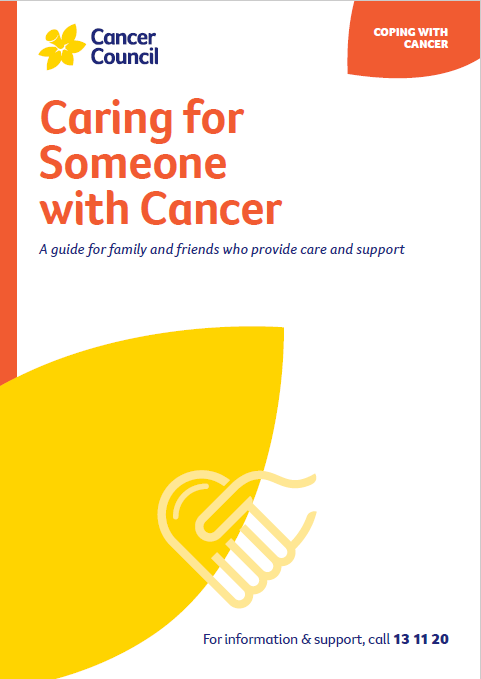- Home
- About Cancer
- Supporting someone with cancer
- Caring for someone with cancer
- How relationships can change
- Changes in sexuality and intimacy
Changes in sexuality and intimacy
If you are caring for a partner, you may find your sexual relationship is affected. The changes will differ depending on the type of cancer, the treatment and its side effects.
Learn more about:
- Ways caring can affect your sexual relationship
- How to manage sexual changes
- LGBTQI+ carers
- Podcast: Sex and Cancer
Ways caring can affect your sexual relationship
Having cancer can affect physical intimacy in different ways:
- Tiredness can make people lose interest in sexual activities during and after treatment. This is called a lowered libido.
- Cancer treatments, medicines and pain can also reduce libido and may affect someone’s physical ability to have sex.
- A person’s body image may change during and after treatment, making them feel self-conscious and embarrassed.
- The person with cancer may be feeling sensitive and sore, and may not want to be touched.
- The emotional strain of cancer or caring may preoccupy you and cause you to lose interest in sex.
- Many people worry that physical intimacy might be painful.
- You might find it hard to switch between the roles of carer and lover.
- You might feel guilty if your partner is unable or unwilling to be sexually active and you still want a sexual relationship.
How to manage sexual changes
- Talk openly with your partner about how you’re feeling – communication is an important sexual tool. Sharing your concerns will help you explore new ways to be intimate.
- Being open about your sexual needs can help you find ways to manage them. If you keep quiet and withdraw, your partner may misinterpret your actions and think they’re no longer desirable.
- Try other forms of intimacy such as touching, holding, hugging and massaging. Physical contact that doesn’t lead to sexual activity can still be comforting.
- Spend time together doing other things you both enjoy. This way sex isn’t the only way that you show your affection and intimacy.
- Tell your partner you care. Your partner may need reassurance that you love them and find them attractive despite the changes from their illness.
- Have your partner show you any body changes before sexual activity. Looking at and touching these areas may help both of you get more comfortable with the changes.
- Keep an open mind about ways to give and receive sexual pleasure, especially if your usual sexual activities are now uncomfortable or not possible. Try different lubricants or sexual aids.
- Take things slowly and spend time getting used to being naked together again.
- Be patient. You may find that any awkwardness will improve with time and practice.
- Talk to a counsellor who specialises in helping couples with intimacy and sexual issues. An occupational therapist on the treatment team can suggest practical strategies for positioning and fatigue management.
For more on this, see Sexuality, intimacy and cancer, and listen to our podcast below.
LGBTQI+ carers
Although all carers have the same rights, regardless of sexuality or gender, LGBTQI+ carers may face specific challenges. They may worry about health professionals or the person’s family or friends accepting them, or wonder if support services are LGBTQI+ friendly.
Talk to your GP about local services that can help. You can also contact QLife, a national counselling and referral service for LGBTQI+ people. Call 1800 184 527 or visit QLife.
See LGBTQI+ people and cancer for ways to deal with the challenges you may face.
Podcast: Sex and Cancer
Listen to more of our podcast for people affected by cancer
More resources
Dr Alison White, Palliative Medicine Specialist, Royal Perth Hospital, WA; Tracey Bilson, Consumer; Louise Dillon, Consumer; Louise Durham, Nurse Practitioner, Palliative Care Outpatients, Princess Alexandra Hospital, QLD; Katrina Elias, Carers Program, South Western Sydney Local Health District, NSW Health, NSW; Jessica Elliott, Social Worker, Youth Cancer Services, Crown Princess Mary Cancer Centre, Westmead Hospital, NSW; Brendan Myhill, Social Worker and Bereavement Research Officer, Concord Repatriation General Hospital, NSW; Penny Neller, Project Coordinator, National Palliative Care Projects, Australian Centre for Health Law Research, Queensland University of Technology, QLD; Olivia Palac, Acting Assistant Director, Occupational Therapy, Gold Coast University Hospital, QLD; Nicole Rampton, Advanced Occupational Therapist, Cancer Services, Gold Coast University Hospital, QLD; Shirley Roberts, Nurse Consultant, Medical Oncology, Northern Adelaide Cancer Centre, SA; Dr Elysia Thornton-Benko, Specialist General Practitioner, and UNSW Research Fellow, NSW; Kathleen Wilkins, Consumer; Helen Zahra, Carers Program, South Western Sydney Local Health District, NSW Health, NSW.
View the Cancer Council NSW editorial policy.
View all publications or call 13 11 20 for free printed copies.

